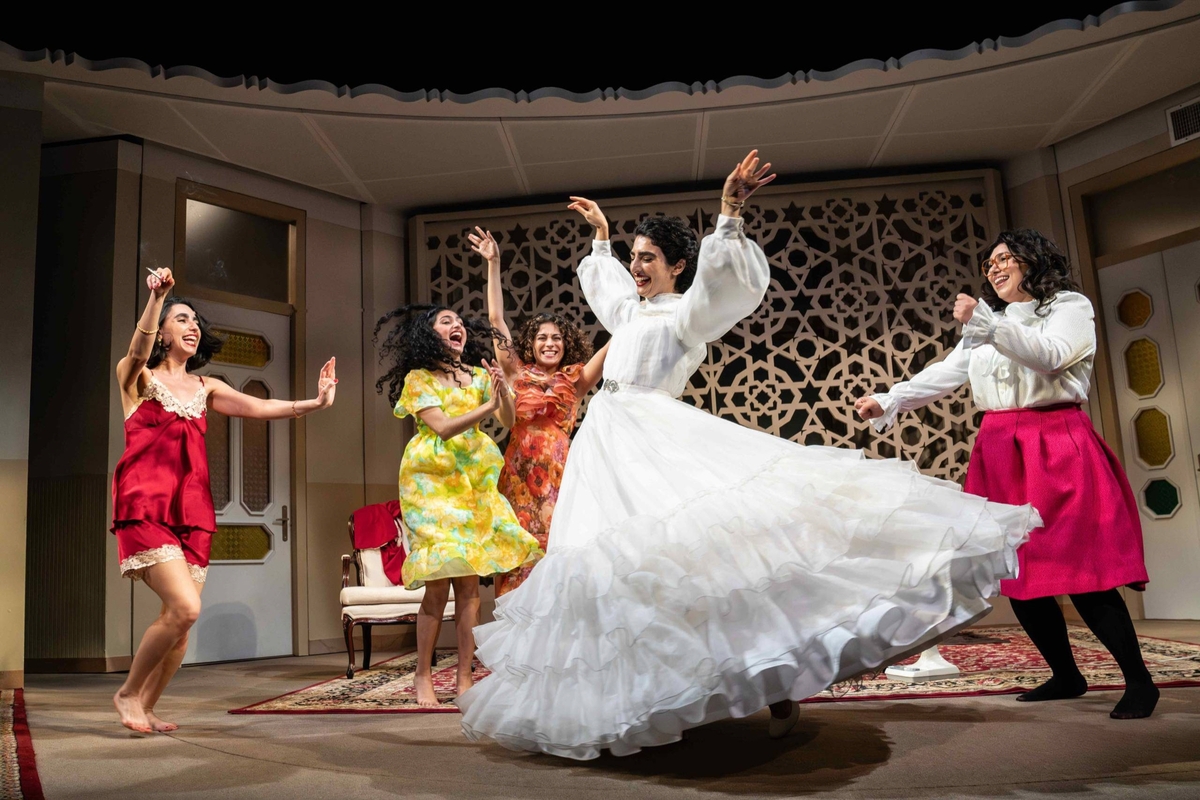
Joan Marcus Photo
Vaneh Assadourian, Ava Lalezarzadeh, Anita Abdinezhad, Bahar Beihaghi, and Shadee Vossoughi.
Five female friends prepare for the wedding of one of them. High-spirited, vivacious, thoroughly at home with one another. They are Iranian, in Karaj, Iran, and it’s 1978, just before the monumental change that occurred when the Shah fled Iran and the country was taken over by Ayatollah Ruhollah Khomeini, a Muslim fundamentalist, in 1979. Much of the poignancy of Sanaz Toossi’s Wish You Were Here — now playing at Yale Repertory Theatre through Oct. 28, directed by Sivan Battat — stems from that introductory scene. We won’t see these five together again, and none of them will ever again be this light, vain, frivolous, raunchy, and comfortable with one another. It’s a scene that becomes, in hindsight, more and more rich in possibility the further the play goes into these women’s occluded futures, eventually reaching 1991.
It’s daring of Toossi to start the play at a high point, introducing five characters we’d gladly watch spar and primp and laugh and joke and throw shade for the rest of the evening, then chipping away at all they value in one another. Some authors might give us the “how it began” flashback at the end, as though the play had the ability to erase time and make the characters, in their youth and joy, come alive again. Toossi sticks with strict chronology; though some might believe in a return to a more liberal Iran sometime in our future, those days will not come again for those who were adults when the Islamic Revolution happened.
The first loss is Rana (Vaneh Assadourian), charismatic, sharp, and Jewish. Were she and her family incarcerated, or did they flee? No one knows for certain, and the disappearance of such an intriguing character is our loss too. But that, too, is a brave choice, for the loss of Rana becomes the most telling experience for the four remaining friends — a crack in their bravado that will rankle the more as they go forward, not knowing and trying to act like it doesn’t matter. And each subsequent check to their own natures takes its shape from that first shock.
In that opening scene, Salme (Bahar Beihagi) is the bride, and we might expect her to be the play’s focus. But her centrality is, we might say, peripheral. She’s the most religious, so the imposition of regulations on feminine behavior and dress — and the closing of the universities during Iran’s war with Iraq, waged from 1980 to 1988 — have less effect on her than others. Nazanin (Anita Abdinezhad) had plans to become an engineer; Shideh (Shadee Vossoughi) had begun medical school. As in that first scene, Salme comes to stand for the more traditional and conventional aspects of female life that the other four are chafing against.

The sudden loss of Salme further undermines the group’s solidarity; Sideh has gone to study abroad, and so the five shrinks to the two least alike. Zari (Ava Lalezarzadeh), the most childish at the start, is the play’s second bride, and her increasing maturity becomes a foil to Nazanin’s effort to see them all as they were. Nazanin, who early established herself as a scoffer, is present in every scene, and so we begin to settle into her life, watching her own surprise at the turns it takes.
Key to our understanding of Nazanin is the special relation she had to Rana. “Being your best friend was my whole personality,” Nazanin confesses to Rana late in the play, and, in that first scene when the duo vowed flippantly not to marry or have children and maybe one day to live together in Miami, we might think we’re watching the start of a love affair. Whether consummated or not, we realize that Rana, for Nazanin, is a lifelong love, and that what we euphemistically call “social forces” or “historical situation” separated them, most likely forever.
For all its poignancy, watching the play can be a bit wearying at times mainly due its episodic glimpses of these lives and the world they inhabit as the years go by, a kind of continuity by caveat. And Nazanin, despite Abdinezhad’s engaging performance, is not an easy character to warm to. She prides herself on her aloofness, so that her own wedding day prep scene, however else it plays, reads as cruel irony. Battat — a Connecticut native and a graduate of ECA in New Haven — directs a show that feels far more earnest than the material seems to call for. The show’s physical comedy — waxing to remove leg hair, and embarrassing menstrual moments — didn’t spark, on opening night, nearly the hilarity one assumes they should have. I suspect that Toossi may view her characters with more irony than this production manifests. If so, the play’s comedy should come from the authors’ attitude toward these women who, for all their claims to enduring friendship, barely understand one another’s motives, much less the world around them. True, the show ends with Nazanin’s catharsis — and it is moving — but reaching that point could be a much livelier ride.
Wish You Were Here runs at Yale Repertory Theatre, 1120 Chapel St., through Oct. 28. Visit the theater’s website for tickets and more information.